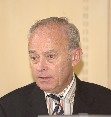|
| Biography |
| |
 Ysbrand Poortman is a biologist by education and has a daughter with spinal muscular atrophy. After teaching in high school and academia, he focussed on issues related to medical research and genetics and on strengthening parent/patient organisations.
Ysbrand Poortman is a biologist by education and has a daughter with spinal muscular atrophy. After teaching in high school and academia, he focussed on issues related to medical research and genetics and on strengthening parent/patient organisations.
In 1967 he founded the Dutch Association for Neuromuscular Diseases and in 1975 he founded the Dutch Genetic Alliance of Parent / Patient Organisations
From 1992 till 2000 he has been vice president of the European Alliance of patient and parent organisations for Genetic Services and innovation in medicine, recently evolved in the European Genetic Alliances’ Network (EGAN, Brussels) of which he is senior advisor.
Since 1994 founder member of the European Platform for Patients Organisations, Science and Industry (EPPOSI, Brussels). He is vice president of the World Alliance of Organizations for the Prevention and Treatment of Genetic Conditions (WAO, New York) and Secretary General of the International Genetic Alliance of Patient organisations (IGA, Washington
He is a founder- & boardmember of the Centre for Clinical Genetics of the Erasmus university from 1980 to 2000 and has a senior advisory function at the Flemish Institute of Biotechnology. He is a member of the college of chairs of the World Life Sciences’ Forum, BioVision and of various other advisory (f.i. Dutch National Health Council), university curatoria and expert committees on the national, European and global level.
|
| |
|
|
| |
| Abstract |
| |
|
“New approaches for prevention by integrating genetic/genomic/biotech knowledge in primary and secondary healthcare” |
|
|
|
Every year an estimated 7.9 million children – 6% of total births worldwide – are born with a serious birth defect of genetic or partial genetic origin. Additional hundreds of thousands more are born with serious birth defects of post conception origin including maternal exposure to environmental agents such as alcohol, rubella, syphilis and iodine deficiency that can harm the developing fetus.(report March of Dimes, 2006)
Genetic knowledge and biotechnological progress have offered understanding of the origins and nature of these disorders on the molecular level and also have provided tools for prevention and treatment. This regards diagnostics, vaccines, nutriceuticals and medicines for common and rare disorders and also options for screening and testing and family planning based on genetic counseling. Experience from high income countries shows that overall mortality and disability from birth defects can be reduced by up to 70 %.
Limited application of this knowledge and technology has occurred in lower resource countries where 85% of the world’s six billion people live.
Following the UN- millennium Development Goals ( reduction child birth mortality, global partnerships etc.) the March of Dimes Global Programs and the World Alliance of Organizations for prevention and treatment of genetic and congenital conditions work together to support genetic knowledge transfer and the building of capacity to enable healthcare systems to make effective and responsible use of genetic, genomic and biotech applications as an integrated part of the primary and secondary healthcare system.
.
The World Alliance has developed a roadmap with the ultimate aim to enable people involved to take timely and well informed decisions towards their own health and/or their off spring based on competent networks of genetic services.
Some experiences about exercising this roadmap will be presented. |
|
| |
|